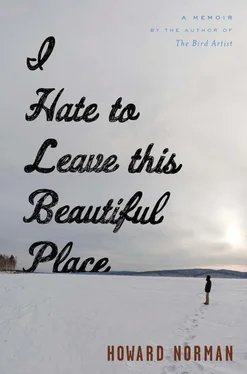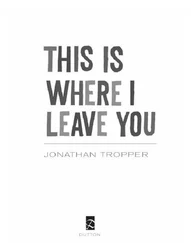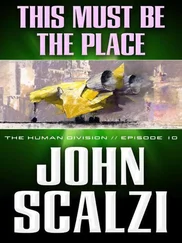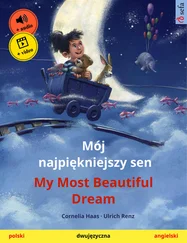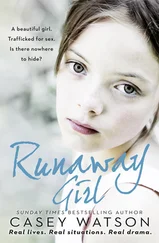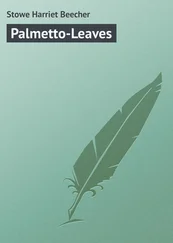Howard Norman
I Hate to Leave This Beautiful Place
For their deep and abiding friendship, Melanie Jackson and Alexandra Altman. And David Wyatt, for all the conversations.
Saigyo, a poet and monk who lived in twelfth-century Japan, wrote, “A soul that is not confused is not a soul.” That philosophy served me as a talisman throughout the writing of this book. I kept asking, How does someone with a confused soul, as I consider mine to be, try to gain some clarity and keep some emotional balance and find some joy, especially after a number of incidents of arresting strangeness have happened in a life?
I have always felt a bittersweet foretaste of regret when getting ready to leave certain landscapes. The title of this book comes from an Inuit folktale, one you will encounter in these pages, about a man who has been transformed into a goose. As winter fast approaches, he begins to cry out, “I hate to leave this beautiful place!”
What is remembered here? A bookmobile and an elusive father in the Midwest. A landscape painter whose plane crashed in Saskatchewan. A murder-suicide in my family’s house. A Quagmiriut Inuit rock band specializing in the songs of John Lennon. And in Vermont, a missing cat, a well-drilling, and my older brother’s requests to be smuggled into Canada. If there is one thing that connects these disparate experiences, it is the hopeful idea of locating myself in beloved landscapes — Northern California, Nova Scotia, Vermont, the Arctic — and of describing how they offered a home for honest introspection, a place to think things through. Often I just wanted to look at birds for days on end, shore birds in particular.
Still, I would be loath to suggest that life intrinsically has themes, because it does not. In this book I narrate a life in overlapping panels of memory and experience. When Henry James used the phrase “the visitable past,” he was largely referring to sites that had personal meaning for him: graveyards, archeological ruins, centuries-old cathedrals. Conversely, this present book contains memories of places that kept refusing not to visit me — unceremonious hauntings, I suppose, which were in equal measure gifts and curses. Since we are seldom stenographers of our hours and days as life unfolds, we remember events with different emotions than those we had when we originally experienced the events (as the haiku master Matsuo Basho put it), and in associative patterns rather than original chronologies. I started this book in the Villa of Fallen Persimmons in Kyoto, Japan, in a landscape I had previously only read about and seen in paintings and films. But most of it was written in Point Reyes, California, and Vermont, each a beautiful place I always hate to leave.
Advice of the Fatherly Sort
ON SUMMER EVENINGS IN 1964, I used to sit on the basement stairs to read and cool down. This was in Grand Rapids, Michigan. August was particularly steamy, and about seven o’clock on a Friday late in the month, I sat there and watched my older brother’s girlfriend, Paris Keller (“I was named after the capital of France,” she said), who was wearing blue jeans, a T-shirt, and sandals, cross her arms, raise off her shirt, and toss it into the clothes dryer. Lavender in color, it had been soaked transparent by rain on her walk to our house. Paris owned a car but liked to take long walks, too. The T-shirt read EXIST TO KISS YOU, a declaration that was both existential and, for me at age fifteen, almost cruelly erotic.
She stood there naked from the waist up. The shirt tumbled alone behind the dryer’s glass window. Paris looked over at me a few times. We talked awhile. I was all but praying that the shirt needed a second cycle. Paris told me her father had been killed in the Korean War. It was the first conversation I ever wrote down. Typed it hunt-and-peck on an Olivetti manual typewriter. I made a copy on carbon paper, too. I’m looking at the pages now. Remember carbon paper? If you handled a sheet carelessly, you would leave fingerprints on everything you touched, as if you’d broken into your own life.
I liked Paris a lot. More about her later.
To this day, my father’s secret life draws certain difficult associations with an apothecary. In the Midwest in the early 1960s, the word apothecary had not exclusively been replaced by the term drugstore, or even pharmacy. In Dykstra’s Apothecary on Division Street, the proprietor, Peter Dykstra, not only was the pharmacist but occasionally doubled as the soda jerk. In the summer months he’d hire a teenager to work the counter, which had three spin-around red leather seats, each elevated on a silver column, with a silver plate at the base, riveted to the floor. DYKSTRA’S APOTHECARY was stenciled in an arc of bold lettering across the wide front window. One day the radio said the summer was “proving downright tropical.” The fighting in Indochina had completed its transition to the Vietnam War. You could order a root beer float, a coffee, a milk shake, a Coca-Cola — that was it. No, you could also get a grilled cheese sandwich. The apothecary carried an Afrikaans-language weekly. Mr. Dykstra had been born and raised in Johannesburg.
For concocting root beer floats, there was a helmet-headed spigot out of which a pressurized elixir hissed and gurgled into glasses the size of a small flower vase. That summer’s employee was Marcelline Vanderhook, who wore a triangular paper hat bobby-pinned atop her pale blond hair. Her boyfriend, Robert Boxer, a “part-Negro boy from Ottawa Hills High School,” as Marcelline said, had his driver’s license and provided home deliveries using Mr. Dykstra’s Studebaker. Robert was an All-State guard in basketball. Years later, he became a Rhodes Scholar in art history at Oxford. Later yet, he became a successful painter in Paris and then San Francisco, specializing in portraits. I own a small oil painting of his; it shows two elderly black women sitting in wheelchairs, chatting as if on someone’s porch, except the chairs are set out on a dock at Fisherman’s Wharf in San Francisco. Trawlers are moored in the background.
Robert Boxer frequented the bookmobile where I was employed. The driver, a trained librarian named Pinnie Oler, would say, “Hello, Robert. I’ve got a Nehi orange in my ice chest here for you. You want to look at the art books, of course.” Robert would sit in the bookmobile for the duration of the Dykstra’s Apothecary stop, studying with great concentration books about Picasso, Matisse, Georgia O’Keeffe, and a few other world-famous artists. The art section never had more than twenty books in all.
One thing Pinnie Oler told me was that Peter Dykstra had been ostracized and “all but run out of the Dutch Reformed Church” for allowing a mixed-race couple in his employ. At the time, that was all I ever heard about this subject. Except when Robert Boxer said, “I love kicking the shit out of East Christian in basketball. They look up at the scoreboard, last two minutes, and those Hollanders get crazy bug-eyed terrified looks on their faces, all panicky like they just ate a bunch of poisonous tulips, you know? They and us worship a different Jesus, as my Alabama grandma liked to say.” One other thing: Robert Boxer was Peter Dykstra’s son (Robert’s mother had passed away), but Robert preferred to use his mother’s family name, Boxer. The emotions of it all registered in me then in an unlettered way, deep in the nerves. Any real understanding of how the apartheid system in far-flung South Africa was an intensifying element in the racist atmosphere of Grand Rapids came only in retrospect — when, in 1977, I was living in Ann Arbor and read that Robert Boxer’s older brother, Reginald, had been beaten senseless during a violent protest in Detroit against the murder of the activist Steven Biko by the South African police. The name of Robert’s younger brother, James, is on the Vietnam Veterans Memorial in Washington, D.C.
Читать дальше
